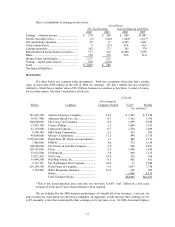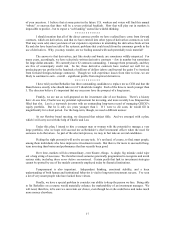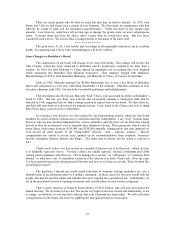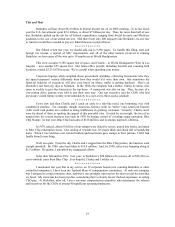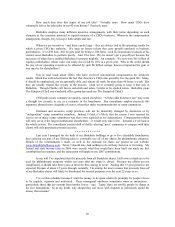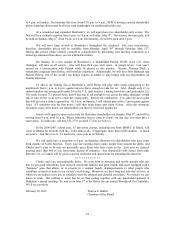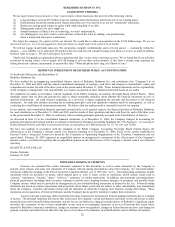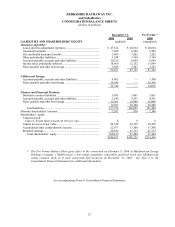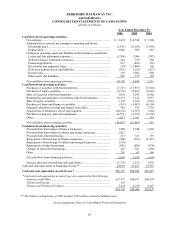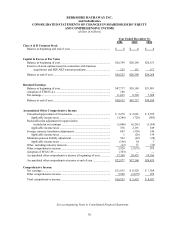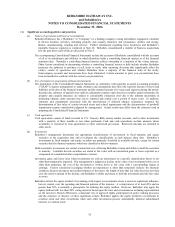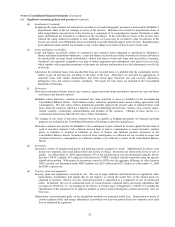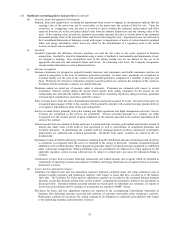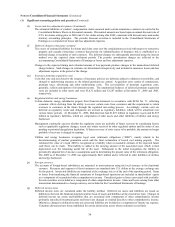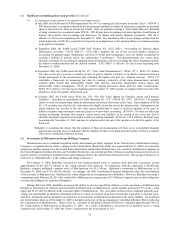Berkshire Hathaway 2006 Annual Report Download - page 26
Download and view the complete annual report
Please find page 26 of the 2006 Berkshire Hathaway annual report below. You can navigate through the pages in the report by either clicking on the pages listed below, or by using the keyword search tool below to find specific information within the annual report.
25
BERKSHIRE HATHAWAY INC.
ACQUISITION CRITERIA
We are eager to hear from principals or their representatives about businesses that meet all of the following criteria:
(1) Large purchases (at least $75 million of pre-tax earnings unless the business will fit into one of our existing units),
(2) Demonstrated consistent earning power (future projections are of no interest to us, nor are “turnaround” situations),
(3) Businesses earning good returns on equity while employing little or no debt,
(4) Management in place (we can’ t supply it),
(5) Simple businesses (if there’ s lots of technology, we won’ t understand it),
(6) An offering price (we don’ t want to waste our time or that of the seller by talking, even preliminarily,
about a transaction when price is unknown).
The larger the company, the greater will be our interest: We would like to make an acquisition in the $5-20 billion range. We are not
interested, however, in receiving suggestions about purchases we might make in the general stock market.
We will not engage in unfriendly takeovers. We can promise complete confidentiality and a very fast answer — customarily within five
minutes — as to whether we’ re interested. We prefer to buy for cash, but will consider issuing stock when we receive as much in intrinsic
business value as we give. We don’t participate in auctions.
Charlie and I frequently get approached about acquisitions that don’ t come close to meeting our tests: We’ ve found that if you advertise
an interest in buying collies, a lot of people will call hoping to sell you their cocker spaniels. A line from a country song expresses our
feeling about new ventures, turnarounds, or auction-like sales: “When the phone don’ t ring, you’ ll know it’ s me.”
REPORT OF INDEPENDENT REGISTERED PUBLIC ACCOUNTING FIRM
To the Board of Directors and Shareholders of
Berkshire Hathaway Inc.
We have audited the accompanying consolidated balance sheets of Berkshire Hathaway Inc. and subsidiaries (the “Company”) as of
December 31, 2006 and 2005, and the related consolidated statements of earnings, cash flows and changes in shareholders’ equity and
comprehensive income for each of the three years in the period ended December 31, 2006. These financial statements are the responsibility
of the Company’ s management. Our responsibility is to express an opinion on these financial statements based on our audits.
We conducted our audits in accordance with the standards of the Public Company Accounting Oversight Board (United States). Those
standards require that we plan and perform the audit to obtain reasonable assurance about whether the financial statements are free of
material misstatement. An audit includes examining, on a test basis, evidence supporting the amounts and disclosures in the financial
statements. An audit also includes assessing the accounting principles used and significant estimates made by management, as well as
evaluating the overall financial statement presentation. We believe that our audits provide a reasonable basis for our opinion.
In our opinion, such consolidated financial statements present fairly, in all material respects, the financial position of Berkshire Hathaway
Inc. and subsidiaries as of December 31, 2006 and 2005, and the results of their operations and their cash flows for each of the three years
in the period ended December 31, 2006, in conformity with accounting principles generally accepted in the United States of America.
As discussed in Note 18 to the consolidated financial statements, as of December 31, 2006, the Company changed its accounting for
pensions and other postretirement benefits to conform to Statement of Financial Accounting Standards No. 158, Employers’ Accounting for
Defined Benefit Pension and Other Postretirement Plans, an amendment of FASB Statements No. 87, 88, 106, and 132(R).
We have also audited, in accordance with the standards of the Public Company Accounting Oversight Board (United States), the
effectiveness of the Company’ s internal control over financial reporting as of December 31, 2006, based on the criteria established in
Internal Control—Integrated Framework issued by the Committee of Sponsoring Organizations of the Treadway Commission and our
report dated February 28, 2007 expressed an unqualified opinion on management’ s assessment of the effectiveness of the Company’ s
internal control over financial reporting and an unqualified opinion on the effectiveness of the Company’ s internal control over financial
reporting.
DELOITTE & TOUCHE LLP
Omaha, Nebraska
February 28, 2007
FORWARD-LOOKING STATEMENTS
Investors are cautioned that certain statements contained in this document, as well as some statements by the Company in
periodic press releases and some oral statements of Company officials during presentations about the Company, are “forward-looking”
statements within the meaning of the Private Securities Litigation Reform Act of 1995 (the “Act”). Forward-looking statements include
statements which are predictive in nature, which depend upon or refer to future events or conditions, which include words such as
“expects,” “anticipates,” “intends,” “plans,” “believes,” “estimates,” or similar expressions. In addition, any statements concerning future
financial performance (including future revenues, earnings or growth rates), ongoing business strategies or prospects, and possible future
Company actions, which may be provided by management are also forward-looking statements as defined by the Act. Forward-looking
statements are based on current expectations and projections about future events and are subject to risks, uncertainties, and assumptions
about the Company, economic and market factors and the industries in which the Company does business, among other things. These
statements are not guaranties of future performance and the Company has no specific intention to update these statements.
Actual events and results may differ materially from those expressed or forecasted in forward-looking statements due to a number
of factors. The principal important risk factors that could cause the Company’ s actual performance and future events and actions to differ
materially from such forward-looking statements, include, but are not limited to, changes in market prices of Berkshire’ s significant equity
investees, the occurrence of one or more catastrophic events, such as an earthquake, hurricane or an act of terrorism that causes losses
insured by Berkshire’ s insurance subsidiaries, changes in insurance laws or regulations, changes in Federal income tax laws, and changes in
general economic and market factors that affect the prices of securities or the industries in which Berkshire and its affiliates do business.


